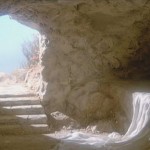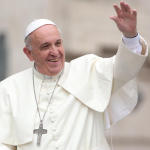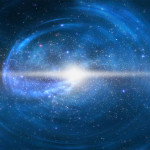Toward a Better Science/Religion Venn Diagram: Responding to Chana Messinger
by Jimmy Akin
Filed under Science

EDITOR'S NOTE: Today's post is in response to yesterday's from atheist blogger Chana Messinger titled I Need a Better Science/Religion Venn Diagram. Be sure to read that one first.
I would like to thank Chana Messinger for her thoughtful and gracious reply to my piece on the need for caution in using the Big Bang to argue for God’s existence.
Here I will offer a few thoughts in response, though I should say up front that I’m not familiar enough with Messinger’s thought to be entirely sure how she’s using certain terms, so if I misunderstand her position, I apologize.
A Possible Misunderstanding
I think that Messinger misunderstands my position when I say:
“Losing scientific support from the Big Bang would not disprove the existence of God. It wouldn't even disprove the Kalaam cosmological argument. It would just mean that the premise in question would have to be supported some other way.
If it were to turn out that the Big Bang was not the beginning of the physical universe then this argument in apologetics would have to be revised.
That's nothing to be ashamed of, though. Apologetics, like the physical sciences, is subject to revision based on the evidence available at the time.”
She takes this to imply:
"Akin is not merely more sure of God and Catholicism than of science. He is infinitely more sure. . . . There is simply no evidence that will change his mind about God."
It was not my intention to claim anything that strong. I merely meant:
- If it turned out that the Big Bang was not the beginning of the universe then this would not disprove God’s existence. There are other arguments to be considered.
- Similarly, it would not mean that the universe had no beginning. From a Christian perspective, it would have one—simply farther back.
- And finally, it might be possible to fashion another version of the Kalaam argument using different arguments (ones not involving the Big Bang) to support its premise that the universe did have a beginning.
I was not trying to imply that belief in God automatically trumps science or that there is no possible evidence that could rationally cause one to change one’s mind about God existing.
Those are interesting but separate questions, and I wasn’t trying to address them.
For space reasons, I’m afraid I won’t be able to address them here, either, but perhaps I can in the future.
In the meantime, I’d like to address a very interesting subject that Messinger brings up...
Non-Overlapping Magisteria
She is correct when she says that I subscribe to the same school of thought as Stephen J. Gould (and Augustine, Aquinas, John Paul II, and others) when it comes to the question of non-overlapping magisteria.
For those not aware of this idea, it is the claim that different disciplines may be suited to different types of questions, and they may not have a great deal of overlap with other disciplines.
Thus science may be better suited to addressing some questions, philosophy others, and theology still others.
Even Gould, though, did not claim that the magisteria of science and religion do not have any overlap. In his book Rocks of Ages, he acknowledges that the two spheres “press upon” each other when it comes to certain questions. They do have some overlap.
Although I wouldn’t put it the way that Messinger does, I think she is correct in stating that the Bible does make some claims that belong not just to the sphere of faith but to the sphere of history as well.
Jesus did exist, he did die, and he did rise again. The Christian faith claims these, and if any of them is false then Christianity is false.
I wouldn’t say that these fall into the realm of science, though. They fall into the realm of history, and—absent the invention of a time machine—we can’t verify them empirically (i.e., through personal observation and testing).
We also can’t verify most historical occurrences empirically. There is no way to empirically verify the existence, death, and non-resurrection of Julius Caesar.
Instead, we have to use other means (e.g., the evaluation of ancient testimony) to establish these ideas.
The Burden of Proof
Toward the end of her piece, Messinger writes:
"Atheist argumentation may have its flaws, but it is generally consistent on its epistemology: reason and empiricism. Perhaps the Catholic response is well documented in the literature, and I am simply insufficiently familiar with it. But as I currently see it, the onus is on Catholics to give a more thorough account of exactly how the epistemologies of faith, reason and empiricism interlock, what predictions they make, and which beliefs they feel are fundamental, versus which they would be willing, in the final analysis, to relinquish to the cleansing fire of truth."
Messinger is correct that there has been a great deal of discussion of these issues in Catholic literature, which perhaps we can discuss in the future.
I want to note that I agree with her that, in this case, “the onus is on Catholics to give a more thorough account.”
The reason is that, in this case, the Catholic is asking the atheist to consider the Catholic viewpoint.
Any time you are asking someone to reconsider their view and think about adopting yours, the burden of proof is on the one making the invitation.
In the same way, the atheist would shoulder the burden of proof if asking a Catholic to consider the atheist viewpoint.
I hope we can discuss this more in the future, and I thank Messinger for a refreshing exchange.
Related Posts
Note: Our goal is to cultivate serious and respectful dialogue. While it's OK to disagree—even encouraged!—any snarky, offensive, or off-topic comments will be deleted. Before commenting please read the Commenting Rules and Tips. If you're having trouble commenting, read the Commenting Instructions.












